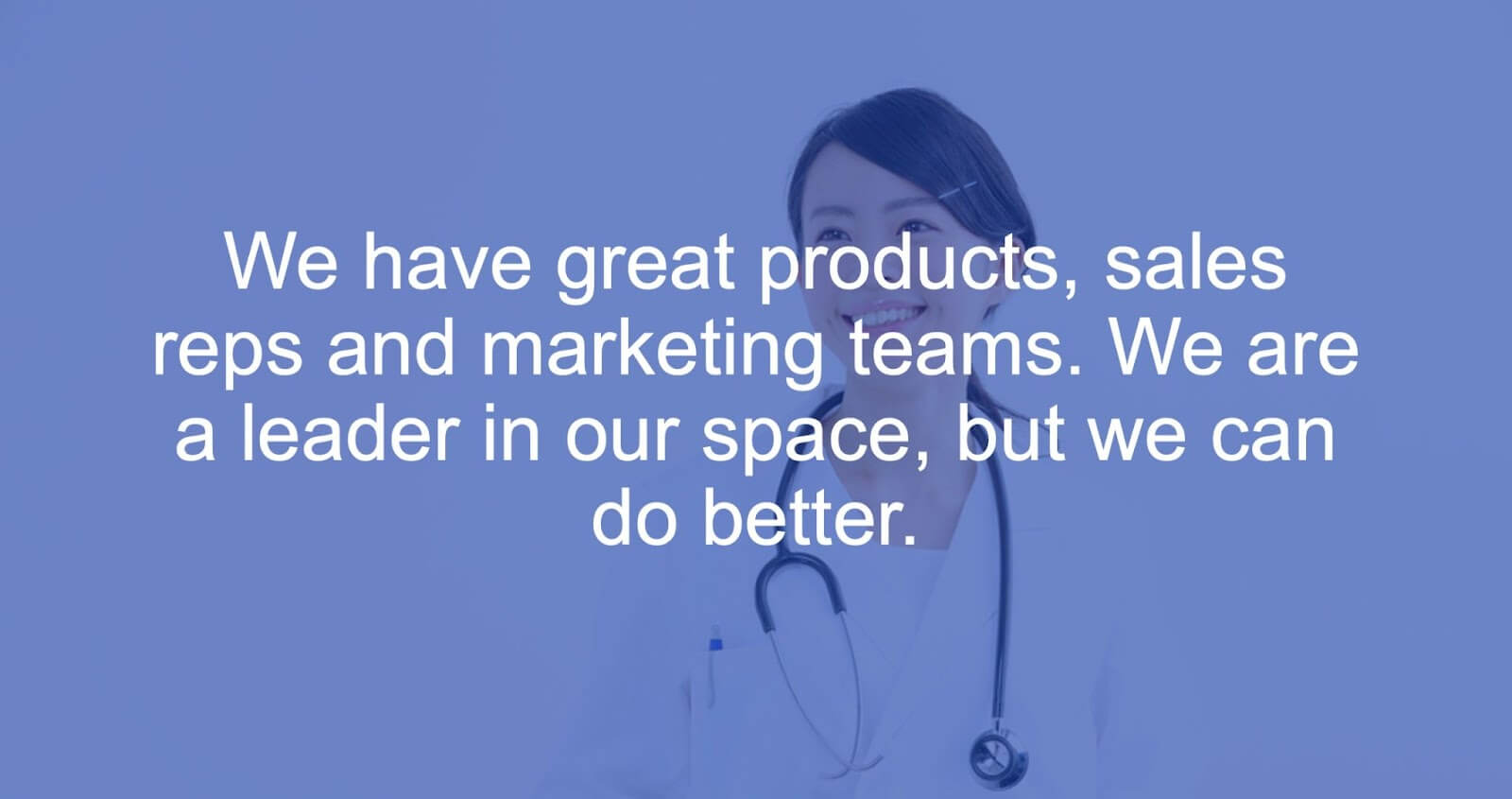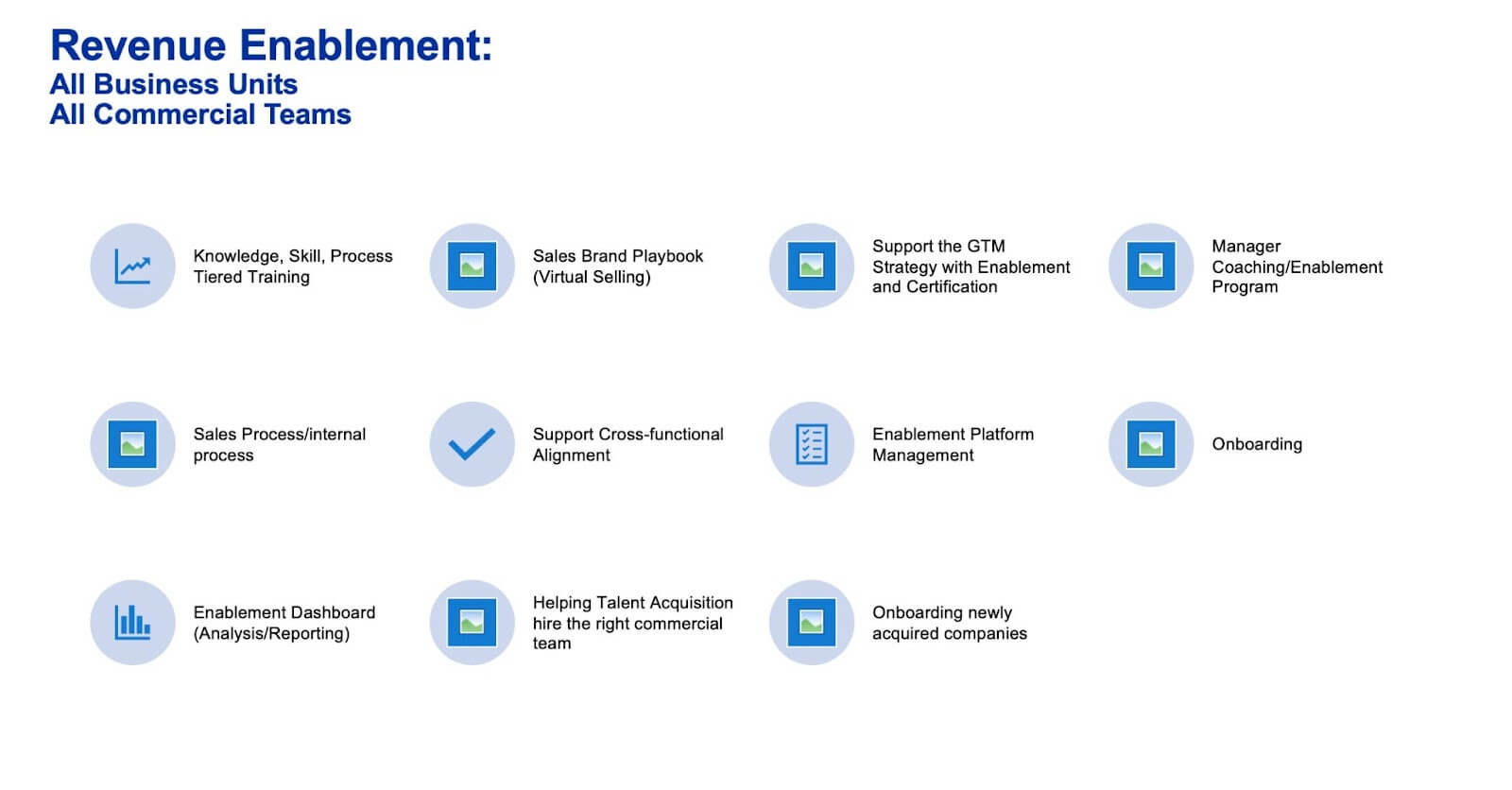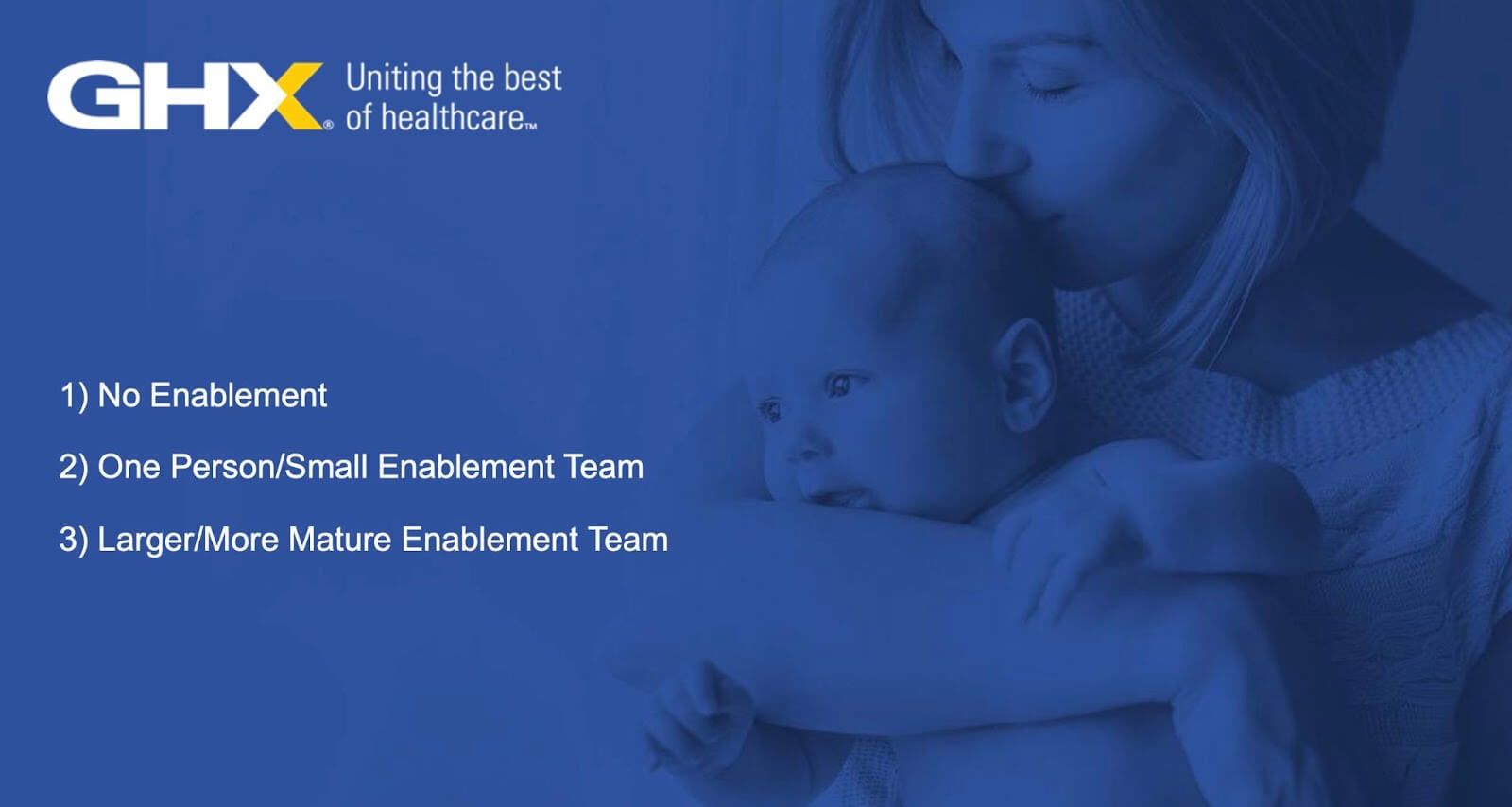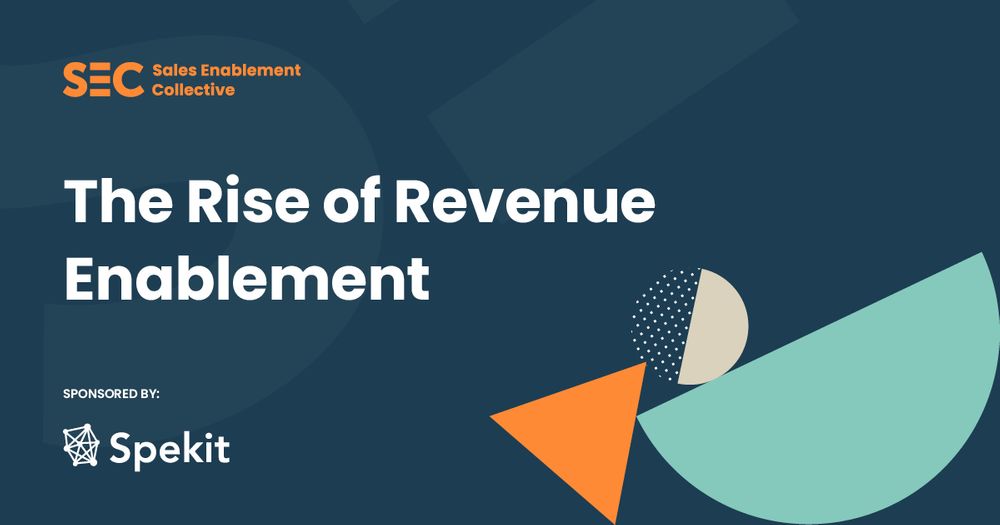Jaclyn D'Arcy, Director of Revenue Enablement at GHX, gave this presentation at the Revenue Acceleration Festival in March 2021.
Growing a revenue enablement function within an organization is hard, especially if you’re taking it on solo, but it can greatly impact your revenue goals, and more importantly your speed to those goals.
No matter the stage of your enablement maturity, there are always ways to get started, and in this article, I’ll share ways to grow and expand this team in an organization.
My name's Jaclyn D’Arcy and I lead the Revenue Enablement team at the Global Healthcare Exchange. In this article, I'm going to talk about the value of having a revenue enablement team and some of the ways to grow and expand this team in an organization.
I think of enablement like building and maintaining a car, you may have all the parts, and they may fit together nicely in the body of the car, but unless you have each piece of equipment firing on all cylinders, communicating with each other, and working towards one goal - running efficiently - you may experience some problems that will prohibit you from going from A to B safely and quickly.
That is what I want to talk about in this article.
Some of you may experience what's on this image.

You have great people, great teams, you have strong marketing support and expertise and incredible industry changing solutions. Why are you still missing opportunities every single day? Why aren't we firing on all cylinders?
This is something we experienced in the past six to 12 months. Why does this matter? There's been a major shift in our environment and our industry with the pandemic the past year. You probably have most of the tools you need, but you just need some way to put them together.
Does that sound familiar?
Sales enablement - revenue enablement
The purpose of revenue enablement is to better align commercial teams, get reps fluent in our solutions, and develop soft skills. This is what will lead to a best-in-class commercial organization.
What does this actually mean?
This is going to be different depending on what maturity your organization is at as it relates to enablement and effectiveness. But sales enablement must shift to revenue enablement.
At a time when our entire world has changed, so must the support for and development of our reps. I view enablement as being responsible for three things to ultimately grow revenue; talent, assets, and communication.
It's essentially a team that's dedicated to increasing the speed to value of new and existing commercial team members. The big difference here is the focus on all revenue-generating team members, versus just the new logo sales team.
If this is done, you will not only build a system that works right now for your current teams, but you will also build a self-sustaining system that works so well that it continues to attract and retain the right people. That's the goal, right?
Great people, great processes, great enablement.
We have the power to change our culture and therefore our results.
Enablement maturity
For the purposes of this article, I'm going to group the enablement maturity curve into three different buckets.
- Bucket one is no formal enablement team, marketing, sales operations, they work together to get the sales team what they all need to sell. I'm sure you've either been part of a team like that, experienced that, or maybe that is your current state right now.
- The second group I'm going to bucket this into is having a one-person or a very small enablement team. Most likely, you're probably focused on just the new logo sales team, that prospecting team that's out there, the hunters of our team.
- The third bucket is going to be the larger, more mature enablement teams. They're really focused on all revenue-generating teams.

Depending on what maturity you're at, you're probably going to focus on just a couple of these versus a full-fledged efficiently running revenue enablement team that's going to be able to do all of this.
I'll get into what each team will be able to cherry-pick and do but first, I'm going to go through the universe framework, if you will, of this image.
Knowledge, skill, process tiered training
The first node you're looking at here is the knowledge, skill, process tiered training. What I mean by that is being able to have a tiered approach to training.
Knowledge
Knowledge, think of product training, solution training, features and benefits, new messaging training, compelling events driven messaging. Anything where it's content that you want your team to really learn and understand from a solution perspective.
Skills
Skills training, you can think of that as handling objections, impact questions, storytelling, being able to properly qualify and discover. It's more of those soft skills that are really important in the sales process, and really, in the customer journey.
Process
Process training, of course, the sales process you follow, building a playbook around that, that kind of training is really important. For a very mature revenue enablement team, you're going to create a knowledge skill process training strategy, not just for your sales team, but for any of your client facing teams.
That could be your renewals team, your upsell team, your solution specialist team and that's what's included.
Tiered training
I want to talk a little bit about what tiered means and this is something I think is really tough to do. But if you can, it will really make an impact on how your team is absorbing, learning, developing, and therefore progressing in their career.
And at the end of the day, retention, it's how you're going to keep your reps at your office.
At the crux of tier training, it's really how do you create a training program and strategy that meets your rep where they're at? So if you have more junior reps, how were you able to build trainings that focus the skill sets or knowledge base for them where they're at?
Versus you're more experienced tenured reps, who would be really bored by a general spin, impact questions training. Being able to create that tiered approach at different job levels and at different teams is incredibly important.
Sales brand playbook (virtual selling)
The other side of this is sales brand playbook. This is something my SVP Scott Kelly created, a really exciting concept, which is, how do we create a brand around who we are to the customer and how we show up to them every single time we interact?
Whether it's a text message, an email, a phone call, a meeting, an person. A big part of this playbook is building the discipline and the habits of high-performing sales team members.
This is such a critical part of why you want to stand out and how you want to show up.
Support the GTM strategy with enablement and certification
The next thing is the support for go-to-market strategy and enablement. The other part of this is of course, as your go to market is feeding into your knowledge training, a big component of this is certification.
How do you make sure that you are standardizing how you're assessing and certifying and providing feedback for reps across the organization?
We want to make sure that our CS, our client success team, our solution specialist team, and our sales team are all speaking the same language and that's our buyers’ language and explaining it the same way.
So no matter who they get from GHX, they know who they're getting, they know what the product or the solution is, and they can expect the same level of service throughout.
Virtual selling
The other part of this is the virtual communication and presentation. Another part of the sales brand because of the pandemic is doubling down on virtual selling. This is where we really strengthen our team's ability to build relationships virtually and that is a really big component of our sales brand as well.
Manager coaching/enablement program
The manager coaching program is a really awesome opportunity to double down and standardize your training as well. If you have an eight person sales team, awesome, your enablement, your marketing team are probably intimately involved and part of coaching your reps.
If you have a 200 person sales team, you have to be able to scale which means putting in place a manager enablement program that includes coaching, is going to be critical for scaling your efforts and your activities.
Sales process/internal process
At GHX we follow the buyer-led journey. This is a really awesome way for us to standardize how we're talking to our customers and making sure we always have the lens of the buyer.
That is something you'll definitely want to create if you don't have that already.
Support cross-functional alignment
This I cannot emphasize enough. One of the really awesome things about GHX and why I feel really lucky to work here is we have an incredible global marketing team.
They are on top of every single type of solution playbook, helping us understand from the customer's viewpoint, getting us case studies and success stories to prove our ROI.
They are doing an incredible job and because of the close relationship between revenue enablement and marketing, we're able to divide and conquer and collaborate on so many more assets and materials to serve up to the sales team.
I'll get into a little bit of how we do that. But one thing that I can't emphasise enough is building cross-functional alignment with your revenue operations or sales operations, marketing, solution engineers, your product teams, customer success, renewals.
There are so many teams and that's really why revenue enablement can serve a unique purpose. Where there are so many teams that are firing on all cylinders, potentially, how do we make sure we're all speaking the same language, we're communicating, nothing is getting lost in translation, and the left-hand knows what the right hand is doing.

Enablement platform management
This one I'm also very passionate about. Lumere was a company recently acquired by GHX in January of 2020. I started with Lumere before I joined GHX and we use a software platform called Showpad.
It is a LMS enablement platform - if you don't have an enablement platform, I highly recommend you get one, and here's why.
Essentially, the biggest pain point sales teams, revenue-generating teams, and commercial teams experience is access to content.
- Where is the content being kept?
- How do we have rev control?
- What's my one source of truth?
- How do my marketing and product teams communicate with our client facing teams and make sure that they have what they need, get that cross-functional feedback? And
- How do we really train and develop and coach our reps?
For us a GHX, Showpad checked all of those boxes. Their platform has a content and coach component.
Content
Content is our one source of truth, we're able to organise all of our content based on solution and compelling event, as well as cross alignment with a buyer led journey.
So when our team is moving an opportunity through, they're able to see automatically the content and assets that will help them move this deal through the sales process quickly, what's most relevant, and what has the best metrics for success.
Coach
As you're building up boarding and onboarding programs, the coach platform at Showpad is an incredible way to organise your curriculums, build paths, have content, and not only that but create a feedback loop where our team can practice pitching and explaining the value prop, getting feedback from their managers, from the admins, from the executives.
It creates this transparency between practice, feedback, all levels of the organization, and then what the actual client and customer experience is. So it's a super powerful tool, I would definitely encourage you to check out a platform.
Onboarding
Onboarding and up-boarding are going to be a crucial part of, of your enablement journey. Onboarding is going to include HR, IT, sales ops, marketing, you want to bring the universe around this rep, to be able to ramp up their speed to value as quickly as possible.
Your LMS probably has an onboarding path - Showpad does - that's really helpful in building that out, and especially if you have long sales cycles, it really cuts down that time.
Enablement dashboard (analysis/reporting)
This is an incredible feature. You probably have a sales ops or rev ops team that does an incredible job with metrics, reporting, analyzing data, keeping our sales team on track, and making sure everyone understands where we're at any point in time.
One thing I think is a blind spot for a lot of companies right now is the ability to see, besides the numbers, how else is our team performing?
Imagine a world where managers are given a dashboard saying, "Hey, these are your 15 reps that report to you, this is where they're at as far as percent to close, how many deals, what's their speed through sales cycle", all of those kinds of normal sales ops numbers and data.
But on top of that, you have:
- What were the past five certifications they went through?
- What were their scores?
- What's the feedback on their pitches?
- How are they doing with skill training like objection handling?
- How are they able to tell this success story?
- Did it move the needle?
- Where are some metrics on that?
Being able to have that greyer area of soft skill development, as well as training and coaching that you can feed into one report.
That dashboard, from a manager perspective, is really powerful because then they're able to go in and be laser-focused and see the areas where they can coach and support and grow their reps, versus not really having that visibility.
Onboarding newly acquired companies
Mergers and acquisitions, if your company is a company that does acquisitions, making sure that the same onboarding strategy you have for reps you have from a company or startup level as well.
Being able to bring in a company quickly is going to be really helpful.
Helping talent acquisition hire the right commercial team
This is something where your organization may already have this ingrained or you may be separate departments and don't really talk much about that.
But enablement, because we're so tuned into the real DNA of commercial team members, and what makes someone effective and really good at what they do, and how we grow that, has a unique lens for how to hire and how to really bring those types of candidates we know will succeed in your organization.
Partnering with your talent acquisition and recruiting teams is a really great way that enablement can help with incoming applicants and new hires. I definitely encourage you to look into that as well.
The three tiers
Now I want to talk a little bit about the three different tiers.

Tier one I mentioned was for maybe you don't have an enablement team specifically, and tier two was maybe you have a smaller sales enablement team.
One person/small enablement team
If you have a smaller sales enablement team try to focus on similar elements, but only for the sales and prospecting team in your commercial organization.
New logo team
Most likely what is going to be the most valuable for your teams is if you are able to quickly scale, improve, and grow the new logo sales team.
If you can't scale to all of the different teams, I would say focus on the new logo team and start building the infrastructure for the value enablement brings there.
Start by developing that knowledge skill process training, if you can, if you have a handle on those three buckets and start a training cycle, think about how you might tier it out and think about how you might layer on that last bit of certification to start streamlining how you evaluate your reps.
Onboarding program
I would say after that focus on developing a really strong onboarding program and build that basic dashboard. It doesn't have to have all the bells and whistles at the end of the day. You just have to start thinking about the metrics that really matter and are going to move the needle and are going to be important to serve up to your executives.
You want to be able to show growth and progress in your reps in a digestible way. That way, people at the organization know how to help the important team of new logo sales. Those are some of the low-hanging fruit that if you have a small enablement team, you're not sure where to start, you're not sure what are the different moves to make, I would start there.
Then as you can, your organization depending on what your business goals are will probably help you prioritise the rest. But that's a great place to start.
No enablement
If you don't have an enablement team and you are the really awesome marketing and sales ops people that are just crushing it trying to get your team enabled, first off, hats off, I've been in that position, it's not an easy role.
It's not necessarily your job description, but you know what matters and that passion your reps will absolutely benefit from.
Playbooks
If you don't have an enablement team, and this is just something that needs to happen, I would focus on building out playbooks for every solution.
Step one, you have a solution suite of maybe five solutions, get super granular about each playbook.
- What is the trigger event or compelling event that gives your rep a reason to reach out to your prospect?
- Who are the people they might encounter?
- What questions should they ask to understand their buyers maturity?
- What objections might they hear?
- How should they seize the opportunity to explain your value prop?
Include things like who are your competitors that they should be aware of, and they should be able to speak to? Those kinds of questions can be your outline for your playbook.
Training
Once you've filled in the gaps for that, do a training around it. Explain to your team "Hey, we built this playbook to answer these questions", get feedback from them:
- What are you hearing from the field?
- What did we miss?
- What objections are you hearing that we didn't think we would?
- What's working?
Get those success stories and help share, "Hey, Rep A was able to overcome this objection by seeding it early, and then being able to combat it by saying X". These are all opportunities that if handled the right way are going to really strengthen your relationship with your customers. And for you, it really strengthens the relationship with your reps because they trust you and they want you to help them.
Onboarding path
Once you've built out the playbooks for the core products, think about building out an onboarding path as your team grows.
The next big thing is, if you have the general playbooks for the solutions, start thinking through how you're going to scale these learnings to new members. Because when someone new comes on, it's essentially costing the organization money until they start closing deals. How are you going to quickly onboard them?
You'll notice as you start building an onboarding strategy, you'll start seeing different gaps in the trainings. Make a list of all of the trainings you don't have, but you know are important, and build them one-off.
Whether it's as the rep is going through and you are asking a solution specialist to train them on something, get that in a recording, just start capturing content and training and you'll start building your arsenal and be able to better strategize as you move through that.
These are really the foundational blocks of enablement, and they will have meaningful results in the next couple of months.
Stay calm
You just have to stay focused, stay calm, it's really easy to get overwhelmed because there's so much value revenue enablement can provide to an organization and you guys reading are the right people to do it.
It's going to happen and don't worry. Even the smallest thing of building a playbook is immensely helpful for a team.
Final thoughts
I will close out with this - I know building a revenue enablement team will greatly impact your revenue goals, and more importantly your speed to those goals.
No matter what size of company or what stage of enablement maturity you might be at there are always ways to start and continue building foundational enablement tools and systems.
Of course, every team needs something a little bit different but revenue enablement can be the glue that holds your commercial organization together and start customizing and scaling tools that may already be in play and at your disposal.
Whether you're a 50 person startup like Lumere, or a large enterprise like GHX revenue enablement can be the team that is laser-focused on getting your commercial organization to that next level.
Thank you.
Looking for more tips on building long-term sales relationships? Download the Rise of Revenue Enablement, featuring experts tips and tricks for turning your organization into consistent revenue-generating powerhouse👇



